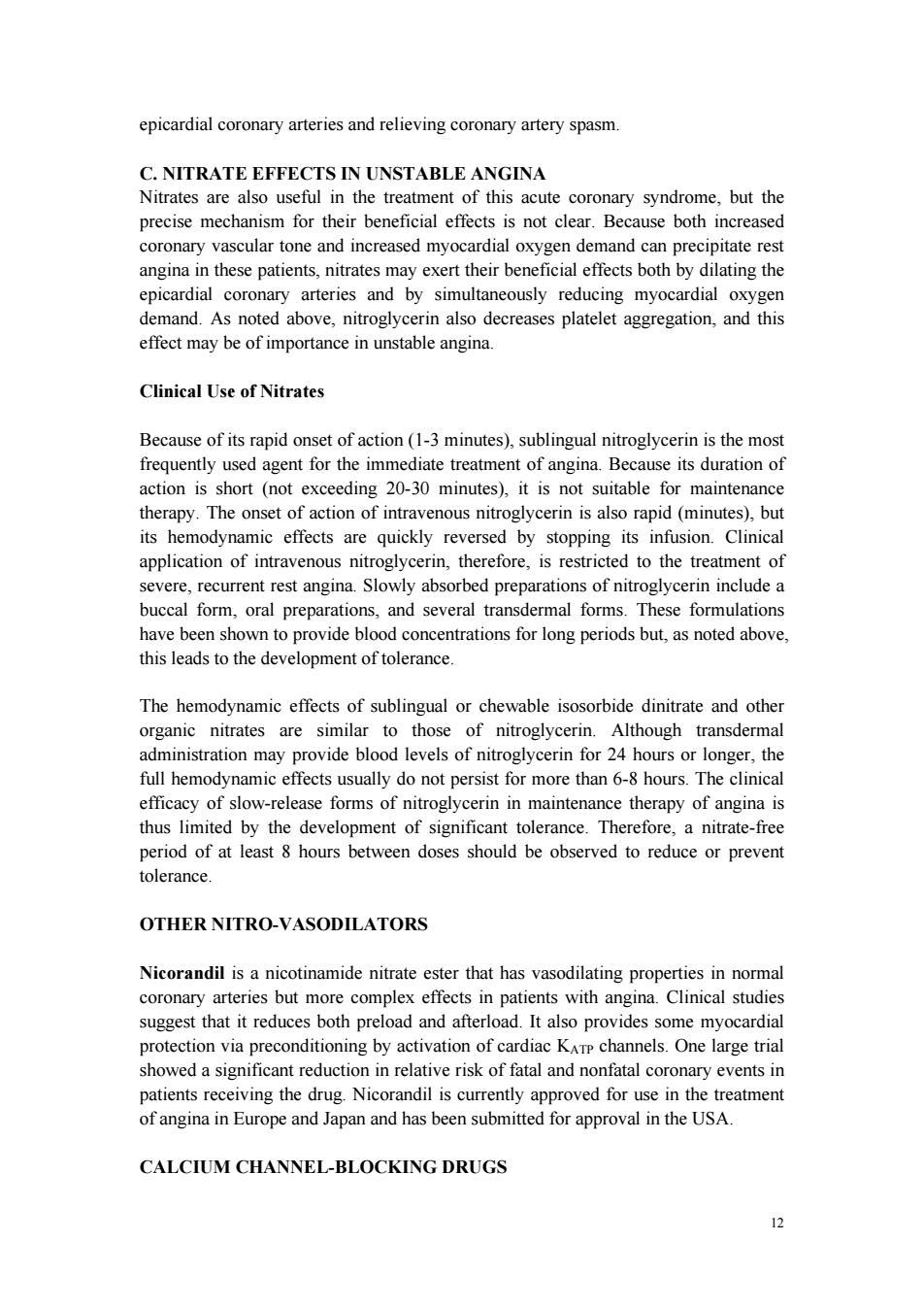正在加载图片...

epicardial coronary arteries and relieving coronary artery spasm. C.NITRATE EFFECTS IN UNSTABLE ANGINA Nitrates are also useful in the treatment of this acute coronary syndrome,but the precise mechanism for their beneficial effects is not clear.Because both increased coronary vascular tone and increased myocardial oxygen demand can precipitate rest angina in these patients,nitrates may exert their beneficial effects both by dilating the epicardial coronary arteries and by simultaneously reducing myocardial oxygen demand.As noted above,nitroglycerin also decreases platelet aggregation,and this effect may be of importance in unstable angina. Clinical Use of Nitrates Because of its rapid onset of action(1-3 minutes),sublingual nitroglycerin is the most frequently used agent for the immediate treatment of angina.Because its duration of action is short (not exceeding 20-30 minutes),it is not suitable for maintenance therapy.The onset of action of intravenous nitroglycerin is also rapid(minutes),but its hemodynamic effects are quickly reversed by stopping its infusion.Clinical application of intravenous nitroglycerin,therefore,is restricted to the treatment of severe,recurrent rest angina.Slowly absorbed preparations of nitroglycerin include a buccal form,oral preparations,and several transdermal forms.These formulations have been shown to provide blood concentrations for long periods but,as noted above, this leads to the development of tolerance. The hemodynamic effects of sublingual or chewable isosorbide dinitrate and other organic nitrates are similar to those of nitroglycerin.Although transdermal administration may provide blood levels of nitroglycerin for 24 hours or longer,the full hemodynamic effects usually do not persist for more than 6-8 hours.The clinical efficacy of slow-release forms of nitroglycerin in maintenance therapy of angina is thus limited by the development of significant tolerance.Therefore,a nitrate-free period of at least 8 hours between doses should be observed to reduce or prevent tolerance. OTHER NITRO-VASODILATORS Nicorandil is a nicotinamide nitrate ester that has vasodilating properties in normal coronary arteries but more complex effects in patients with angina.Clinical studies suggest that it reduces both preload and afterload.It also provides some myocardial protection via preconditioning by activation of cardiac KATp channels.One large trial showed a significant reduction in relative risk of fatal and nonfatal coronary events in patients receiving the drug.Nicorandil is currently approved for use in the treatment of angina in Europe and Japan and has been submitted for approval in the USA CALCIUM CHANNEL-BLOCKING DRUGS 1212 epicardial coronary arteries and relieving coronary artery spasm. C. NITRATE EFFECTS IN UNSTABLE ANGINA Nitrates are also useful in the treatment of this acute coronary syndrome, but the precise mechanism for their beneficial effects is not clear. Because both increased coronary vascular tone and increased myocardial oxygen demand can precipitate rest angina in these patients, nitrates may exert their beneficial effects both by dilating the epicardial coronary arteries and by simultaneously reducing myocardial oxygen demand. As noted above, nitroglycerin also decreases platelet aggregation, and this effect may be of importance in unstable angina. Clinical Use of Nitrates Because of its rapid onset of action (1-3 minutes), sublingual nitroglycerin is the most frequently used agent for the immediate treatment of angina. Because its duration of action is short (not exceeding 20-30 minutes), it is not suitable for maintenance therapy. The onset of action of intravenous nitroglycerin is also rapid (minutes), but its hemodynamic effects are quickly reversed by stopping its infusion. Clinical application of intravenous nitroglycerin, therefore, is restricted to the treatment of severe, recurrent rest angina. Slowly absorbed preparations of nitroglycerin include a buccal form, oral preparations, and several transdermal forms. These formulations have been shown to provide blood concentrations for long periods but, as noted above, this leads to the development of tolerance. The hemodynamic effects of sublingual or chewable isosorbide dinitrate and other organic nitrates are similar to those of nitroglycerin. Although transdermal administration may provide blood levels of nitroglycerin for 24 hours or longer, the full hemodynamic effects usually do not persist for more than 6-8 hours. The clinical efficacy of slow-release forms of nitroglycerin in maintenance therapy of angina is thus limited by the development of significant tolerance. Therefore, a nitrate-free period of at least 8 hours between doses should be observed to reduce or prevent tolerance. OTHER NITRO-VASODILATORS Nicorandil is a nicotinamide nitrate ester that has vasodilating properties in normal coronary arteries but more complex effects in patients with angina. Clinical studies suggest that it reduces both preload and afterload. It also provides some myocardial protection via preconditioning by activation of cardiac KATP channels. One large trial showed a significant reduction in relative risk of fatal and nonfatal coronary events in patients receiving the drug. Nicorandil is currently approved for use in the treatment of angina in Europe and Japan and has been submitted for approval in the USA. CALCIUM CHANNEL-BLOCKING DRUGS